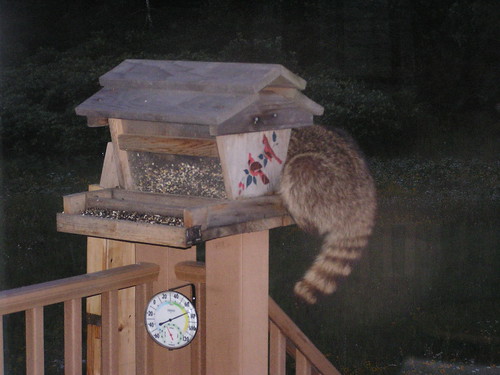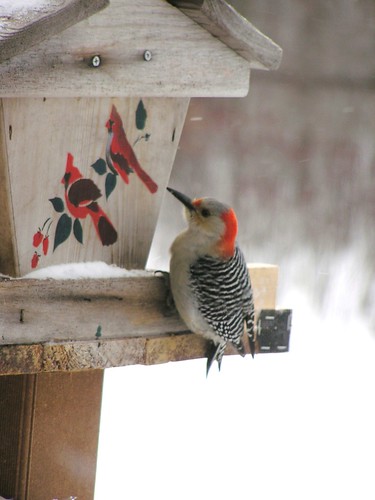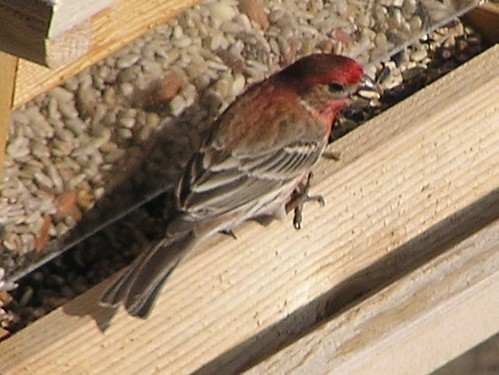Our feeder, a house warming gift from our friends Mike and Natalie, is mounted on our deck about six feet from our sliding glass patio door. Thus we get the full pleasure of being close up and personal with our flying guests. Like this red-bellied woodpecker, a constant presence in our cold east central Minnesota winters. I love watching the gawky way woodpeckers check out the feeder before they start their meal.
In the summer we have a wide variety of guests. The house finches (below) are a common source of brown and red couture. Then there is the yellow and black of the American goldfinches, and the blue of the indigo buntings, and the red, black, and white of the rose-breasted grosbeaks. It's not quite a symphony of colors on the deck, but a least the equivalent of a chamber orchestra.
Recently we discovered we have been missing the antics of a gluttonous night feeder. I caught this flash picture of it one evening.

The following evening our night visitor came back about the same time and I was able to call her a her because she had three babies trailing along behind. As a would-be biologist I should be detached but I have to admit they were darn cute. At this point I was glad to have raccoons on the deck rather than the black bears that completely destroy some feeders in the area. Still I wasn't happy as I watched Mom empty out the feeder. Then she was gone with her little family. But obviously she didn't get all the seeds because sometime later Dad showed up to finish the job. With his hand-like paws he was able to reach in under the plastic sidewall and scrape out the last of the seeds.
I did not want to spend a fortune feeding raccoons nor did I want to encourage them to hang around and become a destructive nuisance. Our feeder is well mounted on the deck so it would not be convenient to bring it in at night as folks living with black bears have learned to do. What to do?
The old red pepper remedy came to mind. I recall reading in a course somewhere that hot pepper is only distasteful to mammals and does not cause a problem for birds. So mixing some hot pepper in with the bird seed is supposed to discourage mammalian diners. Lucky me, I had a bumper crop of hot peppers last year and dried and crushed enough of them to supply all of Domino's for a least a month. So we peppered and we waited.
The first night Mom ate for a little while, then shinnied down the deck post and took off so quickly she left one bewildered baby behind. (Apparently she came back for it later.)
We watched and waited but we had no raccoons for the next several days. "Problem solved" I rejoiced. "I'll just continue with the pepper for a while to make sure Mom gets the point."
Several evenings later I looked out and Mom was back. And she was gobbling up the peppered feed as though it was very tasty. Perhaps she went to Mexico during her absence and learned to appreciate the spiciness of hot pepper. Now the babies were big enough to get up on the feeder too, and Mom was sharing her largess with one of them.
So much for the red pepper idea. Maybe it works with deer, but I don't expect we'll ever have them on our second story deck.
I did not want to spend a fortune feeding raccoons nor did I want to encourage them to hang around and become a destructive nuisance. Our feeder is well mounted on the deck so it would not be convenient to bring it in at night as folks living with black bears have learned to do. What to do?
The old red pepper remedy came to mind. I recall reading in a course somewhere that hot pepper is only distasteful to mammals and does not cause a problem for birds. So mixing some hot pepper in with the bird seed is supposed to discourage mammalian diners. Lucky me, I had a bumper crop of hot peppers last year and dried and crushed enough of them to supply all of Domino's for a least a month. So we peppered and we waited.
The first night Mom ate for a little while, then shinnied down the deck post and took off so quickly she left one bewildered baby behind. (Apparently she came back for it later.)
We watched and waited but we had no raccoons for the next several days. "Problem solved" I rejoiced. "I'll just continue with the pepper for a while to make sure Mom gets the point."
Several evenings later I looked out and Mom was back. And she was gobbling up the peppered feed as though it was very tasty. Perhaps she went to Mexico during her absence and learned to appreciate the spiciness of hot pepper. Now the babies were big enough to get up on the feeder too, and Mom was sharing her largess with one of them.
So much for the red pepper idea. Maybe it works with deer, but I don't expect we'll ever have them on our second story deck.
Not to be completely foiled we did work out a way to stop the raccoon gluttony. It engenders the idea that wildlife was here first and whenever possible we should find a way to coexist. Each morning now we put out only as much feed as we think the birds will eat in a day. The raccoon family may find a few leftovers when they come around at days end, but I don't think they'll be bragging to their friends about the bird seed buffet they've discovered at our house. And we can feel good knowing we are not contributing to a raccoon overpopulation problem by feeding them.

